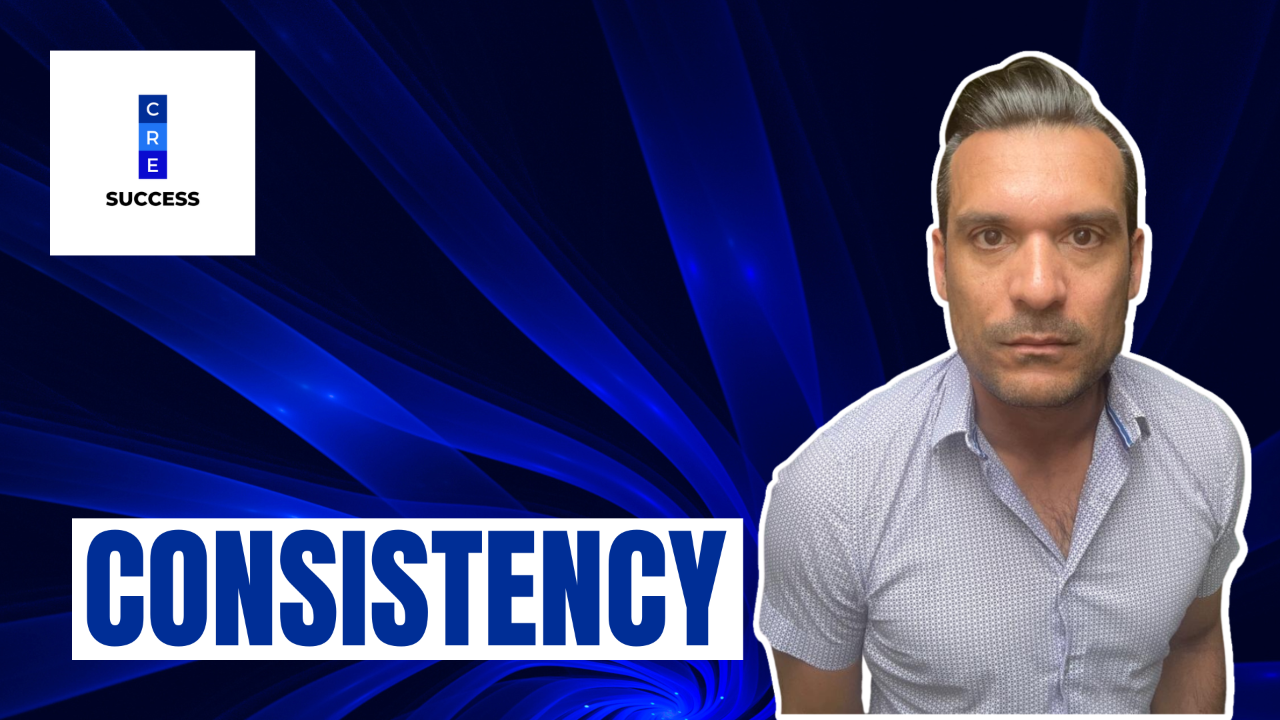A leader's consistency is a cornerstone of effective leadership
Nov 15, 2023
An often-overlooked aspect of being a great leader is the attribute and practice of consistency.
You see, being in charge is not just about making quality decisions; it's about being a stable and predictably positive force for your team, especially in challenging times.
I've seen firsthand with several clients how committing to self-mastery and being disciplined in this area positively impacts businesses.
And when leaders have a clear sense of what their values are to guide their actions, it’s really quite easy to remain consistent.
Being consistent, self-aware, and transparent will enhance your leadership and also help elevate your team’s performance.
To find out how, join me for episode 165 of Commercial Real Estate Leadership.
Episode transcript:
So, one of the traits of a really good leader is somebody who takes the time to get to know the people in their team.
But the trait of a really good leader, a great leader, is someone who not only takes the time to get to know the people in their team, but also takes the time to understand themselves.
And to identify their blind spots, and then to take some steps to put some measures in place to actually improve their performance to mitigate their weaknesses.
And when a leader does that, it sends the signal to everyone else in the business that they should also look to mitigate their weaknesses, that they should look to improve as people.
And when everyone in the business is trying to improve that can put the entire business on a whole new growth trajectory.
In today's episode, I want to talk about what it means to be a great role model and the pitfalls that every leader should avoid, if they want to have a positive and lasting impact on their business.
Hello, welcome to episode 165 of Commercial Real Estate Leadership. I'm your host, Darren Krakowiak. And I help commercial real estate leaders to increase the size of their business.
And there are so many different ways that you can grow a commercial real estate business.
Sometimes when I conduct workshops, I do a bit of a brainstorming exercise where I ask people in the workshop that participants to actually let me know what are all your ideas for growing a business.
And what I found is that they all fall into one of four categories.
So far, I haven't been able to have anyone disprove my theory that there are only four ways to grow a commercial real estate business when you boil it down.
And one of those four ways is organic growth. And that's the focus of our free business growth guide, which is called 'Multiplied Growth.'
When you grab the guide, you get the spreadsheet, so you can plug in numbers from your own business and have a look at how your business can grow using the strategies for organic growth that are detailed in the guide.
And we also have video tutorials for you to understand the concepts better.
You can grab all of this for absolutely free by going to cresuccess.co/growth
Now, one of the best things about running a business like CRE Success is that I get to work with commercial real estate leaders who want to improve.
And when I'm working with them, I get to witness some fantastic transformations.
And I know that the leaders that I'm working with already want to improve.
So, I'm not saying that I'm some miracle worker, there has to be a willingness on the part of the other party to want to improve.
But it is still a source of pride for me when I see people start to act with more intention, more purpose and to actually address some of their shortcomings as leaders and become far more effective at what it is that they do.
To start being the leaders that they want to be, the leaders that their businesses need in order to grow, because ultimately, a business is a reflection of the leaders.
And if the leaders willing to do the work on themselves, then that is often the impetus which can lead to a business starting to grow more.
And when I think about some of the ways that some of the leaders who I've worked with have improved themselves, often it's things that maybe I've needed to point out to them because they haven't been able to see.
But it's also things that I think they know that they just need to be reminded to do. But it's things that they need to improve often.
Some people say that you should focus on your strengths. But I actually believe that you've got to mitigate your weaknesses as much as you focus on your strengths.
And I really believe in the importance of working on your blind spots.
And some leaders that I've worked with have been reacting in an emotional way to certain circumstances, which has been having a negative impact on their business.
And just by being a little bit more calm and acting in a way, which is more measured, they can have a much more positive influence on their team in the face of bad news or when situations are more stressful.
They can actually defuse stressful situations and be a force for good rather than someone who contributes to the stress of the moment.
And in episode 162, we talked about some of the universal traits of leadership being empathy, resilience, and adaptability.
What I'd like to do today is just add to that list and talk about a few other attributes that I believe are important if you want to be a strong leader if you want to improve as a leader.
And one area to focus on is consistency. So, I think rather than being erratic, and rather than our behavior, being something, which is a result of what is going on around us, I think we want to be a source of stability.
And we also don't want to be unpredictable.
And one way that we can be more predictable and more consistent is by acting in accordance with our values, but also having clear values that we've communicated, and that other people understand.
And then if you're acting in a way which is consistent with your values, and you've communicated those values, then it's really the other person's responsibility for not understanding the way that you're acting if you're acting in accordance with your values.
So, I think with leadership consistency is really important and consistency, based on actions which are underpinned by a set of values that have been communicated clearly.
Another element of leadership that I think is important is transparency.
So, I set transparency as one of the priorities when I moved into a leadership role.
Because I could see that the previous leadership was just hiding all of this information, not sharing what was going on in the business and being evasive.
My view is always having nothing to hide.
If your boss is coming into the office, and your boss doesn't usually work in the office, then you should be happy to see them and not worried about who it is that they're going to talk to you.
That was the situation for me when I was in Korea, because the bosses were all in other regional markets.
And other bosses that I've seen in Korea used to be very nervous about when their bosses would come to town.
I used to think, "Well, there's nothing to hide, it's good. Let them come and see as much as as much as they like."
Another, I think, good quality to have is a willingness or an openness to learn.
And one of my clients on a podcast interview recently, Daniel O’Brien, he talked about this idea of leading from the back.
And I shared a clip from that podcast on social media recently, and I got some interesting feedback about it.
You know, it's about knowing that you don't have all the answers, and you don't have to have all the answers.
But sometimes I think it's good to take a step back to let other people have more control, particularly if it's not an area where you're particularly strong, and having the humility to understand that you're not always in the best position to lead.
I think some leaders feel like, "Oh, when someone asked a question, I'd better know what to say",or "I'd better be leading from the front and taking charge."
Because if you're always on leading, then one, that's pretty draining on your energy. And two, it doesn't give other people the opportunity to step forward and showcase their ability to lead.
Ultimately, when you are the leader, the way that you act has a ripple effect, it cascades throughout the organization, it can shape the team dynamics.
And we want to avoid some of the pitfalls. Some of the things that leaders do that if you think about it, you wouldn't like to see in a leader.
And I think, therefore, if you wouldn't like to see it in a leader, it's important to be mindful that you're not exhibiting those traits yourself.
And one trait that I know is human nature, and it's difficult to not have favorites is favoritism.
Now, of course, there's going to be certain people that you like more than others.
But what we don't want to do is have, who your favorites are, be obvious to others.
So, I recommend, for example, that we have one on one meetings with our direct reports every week, and that ensures that everyone receives equal access to you as a leader.
Because if you don't have the system and a process around it, then naturally you're just going to gravitate to spend more time with the people that you enjoy spending time with.
And like I said, it's completely normal to like certain people more than others.
But I don't think it's appropriate to display that favoritism when you are in a leadership position for people who are reporting to you.
Another area to focus on is your own self-awareness.
And talked about blind spots before and you know, emotional intelligence is a few things like empathy and understanding others and understanding yourself.
Understanding yourself, I think, is really important.
I think one exercise that I like to conduct with clients, when I'm looking for an understanding of self-awareness is to ask them, "If your team was going to provide anonymous feedback about you, what would they say?"
And I will often tell people who can't think of anything constructive or negative that their team members might say, "I volunteer some of the negative things that came out about me from anonymous surveys when I was in leadership positions."
So, things like arrogance, anger, or aggression, and something which was actually talked about as a positive but ultimately wasn't negative, which is alcohol drinking, right?
And a lot of stuff they know, "Darren is good, fine, he'll come out and have a drink with us."
But, you know, ultimately, I probably did that too much to my own detriment.
So being able to recognize what it is that you need to work on is identifying your blind spots, being aware that other people have opinions about you, because you are in a leadership position that can go a long way to helping you become a better leader.
And I think it's important. I just want to say that, "You know what, I asked my people what they think of me, and they tell me, you know, we've got a good relationship." And so that's covered.
Like, I don't think saying to somebody, ‘What do you think of me when you're the boss’, is the same as receiving, whether it's unsolicited, or whether it is anonymous feedback.
Because what people say under the veil of secrecy, as opposed to what you give them permission to say, are two different things.
So, it really takes a little bit of introspection to be able to say, this is what I think people would say, when they've got two or three beers under their belt, and they believe it's not going to get back to me.
Or when we're conducting a proper 360 and employee engagement survey, and they've got the opportunity to give anonymous feedback.
What would they say then? Have a think about that.
Look, I think ultimately, if you want to be somebody who has a positive influence on your business, as a leader, intentional and mindful leadership, that leads a positive impact, an imprint on the team is what we should be aspiring to do.
And understanding yourselves, understanding the people in your team is the step to getting there.
And, you know, I would love to help you with that you can always send us an email [email protected]
We've got a process that we run where we help you uncover the number one roadblock that's in the way to helping you grow your business.
If you put the word 'Grow' in the subject line of an email and you send it to [email protected]
We can go through that process. It just takes 15 minutes, and we can see if there's an opportunity for us to help you unlock more growth in your business through your own leadership.
Hey, I hope you're enjoying the show. We're really enjoying bringing it to you. That is our episode for today. Thank you so much for listening and I will speak to you soon.








